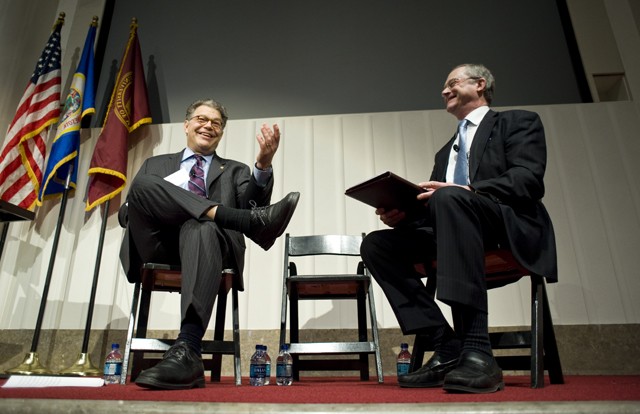Some of MinnesotaâÄôs most prominent health care leaders gathered Friday before a crowded auditorium of tuned-in faculty, community members and students at the University of Minnesota to sort out the details of the new health care reform law. The panelists discussed health care providersâÄô ability to implement the changes, Medicare reimbursement and the cost of the changes. They described an imperfect yet much-needed piece of legislation, the fate of which rests in the hands of the health care professionals charged with bringing it to life. The panel included Sen. Al Franken, D-Minn., Minnesota Commissioner of Health Sanne Magnan, deans Frank Cerra of the Medical School and John Finnegan of the School of Public Health and Rep. Tom Huntley, DFL-Duluth, who leads a number of health policy committees and task forces at the state Legislature, among other high-profile speakers. âÄúWe have now taken another step down the road of recognizing that health is a human right, not a privilege,âÄù Finnegan said, adding that he thinks the United States is one of the only major industrialized democracies that doesnâÄôt acknowledge that fact. âÄúRecognizing some basic level of care to all of our citizens is our obligation as a country.âÄù Much of the discussion centered on the lawâÄôs promotion of a shift from episodic to primary care, a culture change that is believed to eventually save money. âÄúSo much of this bill is prevention,âÄù Franken said, âÄúand everyone knows that an ounce of prevention is worth a pound of cure.âÄù At several points, panel members called the reformâÄôs affordability into question, noting that it lacks cost-containment measures. Franken defended the bill and said much of the financial details will depend on how itâÄôs implemented. The bill will save a great deal of money in preventing diseases that place a significant cost burden on the health care system, a point the Congressional Budget Office would have trouble measuring in their report, he said. Magnan talked about what she called the âÄúthree aimsâÄù of health care reform: to improve the populationâÄôs health, better the patient experience and increase affordability. To achieve that, she discussed the need to create âÄúhealth care homes,âÄù which she said are not so much physical places as they are a philosophy of redefining care to be more patient-centered. With health care costs having risen 70 percent between 2000 and 2007, the need to improve affordability is ever-present, Magnan said. If this pattern continues, the United States will pay more than $75 billion for health care in 2015. Payment reform will need to shift into a system that allows providers to be more creative, she said. Medicare stole much of the show, as many are concerned about the issue of MinnesotaâÄôs low reimbursement rates compared to other states. As the program currently operates, providers are paid for quantity, not quality, Franken said. Minnesota receives about $6,500 for every Medicare patient, while Texas gets $9,500, despite the fact that Minnesota has better outcomes, Franken said. âÄúThis is perverse,âÄù he said. âÄúTheyâÄôre rewarded for looking at health care as being profit-centered. We get punished for looking at it as being patient-centered. WeâÄôre going to turn that around.âÄù To do so, the bill establishes a task force that will examine ways to incentivize high-value care, he said. Richard Norling, senior fellow at the Institute for Healthcare Improvement and former president and CEO of Fairview Health Services, stressed the need for tort reform that would change the system of compensation for malpractice and personal injury. This reform was not included in the law. Without significant delivery system reform to heighten collaboration between doctors and hospitals, Norling said he predicts a cost spiral in the future that will call for more laws concerning malpractice suits and doctor and hospital revenue sharing. Hospitals will need to work to meet the reformâÄôs demands by improving quality and reducing fixed costs, Hennepin County Medical Center CEO Arthur Gonzalez said. âÄúThereâÄôs a lot of internal housekeeping that needs to be done, and weâÄôre definitely setting about that,âÄù he said. âÄúItâÄôs part of our stewardship to the taxpayers.âÄù The crowd applauded after an audience member asked the panel about the possibility of a public option in Minnesota. Huntley responded that he introduced a bill that includes the creation of a public option, adding that it would have to be better than the plans offered by insurance companies. Political science sophomore Ian Campbell said he was impressed that the panel members seemed to be on the same page. Health care reform is necessary and it came about 40 years overdue, but it wonâÄôt come without problems, Campbell said. âÄúI do feel like thereâÄôs going to be a lot more issues that are going to rear their ugly heads down the road,âÄù he said. âÄúItâÄôs nothing we as a country canâÄôt handle. WeâÄôre built on innovation.âÄù

Image by Jules Ameel
Senator Al Franken speaks with John Finnegan dean of the School of Public Health about healthcare on Friday in the Mayo Memorial Auditorium. The speech and discussion were part of a roundtable titled “Health Care Reform: What Just happened.”
Panelists talk health care
Health care leaders gathered at the U on Friday to discuss the new health care reform law.
by Tara Bannow
Published April 11, 2010
0
More to Discover






